By Lucy Komisar
If this play were written today, you‘d expect it to end with a murder or at least some physical brutality. The confrontation between George (Tracy Letts) and Martha (Amy Morton) in Edward Albee‘s riveting, iconic play pursues another kind of violence. Each of those expertly drawn characters, forcefully directed by Pam MacKinnon, commits sizzling, psychological mayhem on the other. It‘s a shock to discover that this college professor and his wife have been married for 23 years and haven‘t yet done each other in.
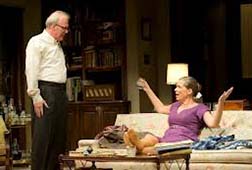
George teaches history at New Carthage College in New England. His wife is the daughter of the college president, her ace in the deck. They are in their 40s. They each married for convenience. He thought it would be a step up; she thought he would be groomed to succeed her father. But he didn‘t have the drive. And in those pre-feminist years (the play premiered 50 years ago in October 1962), she appears to have no other interest or career. So resentment and anger boils up in both of them.
They inhabit a lovely, comfortable professor‘s house, with sofa and arm chairs, a fireplace, and shelves and piles of books. But the conversation is anything but erudite. George accuses Martha of braying. “I don‘t bray,” she brays. They aim words at each other like weapons. She: “You make me puke.”
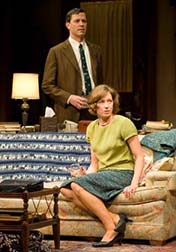
Letts is excellent: intense, sometimes red faced, energetic, tight-lipped. He grimaces when he speaks. He very professorial in a gray cardigan and glasses. He paces with heavy steps. He is often pedantic. Morton as Martha is equally powerful, with eyes that are almost beady, narrowing, focusing hard in a face that is pinched. She wears sweaters that are too tight or low-cut.
Soon there will be an audience. Having met a new biology professor, the diffident Nick (Madison Dirks), who is 28, and his ditsy wife Honey (very well portrayed by Carrie Coon) at a party at her father‘s, Martha has invited them for a nightcap. We see what they will encounter.
Drinks? George inquires of Martha, “Make that rubbing alcohol for you?” Their relationship is passive aggressive. She is constantly putting him down. They curse each other in French. He calls their fights “exercises.”
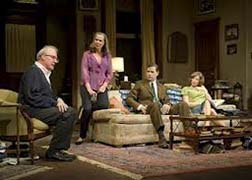
Martha inquires, “Did you clear up the mess you made? George replies, “I‘ve been trying for years to clean up the mess I‘ve made.” She reminds him that he married her for her connection. Their game is to hurt each other.
Are they just vicious? It‘s more than that. At a moment of self-revelation, Martha admits that George is the most important person in the world to her. George, who she says, “is good to me and I revile. Who can make me happy and I do not wish to be happy. Who has made the insulting mistake for loving me and must be punished for it.” So what is going on here?
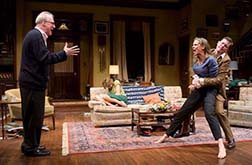
Now they have other targets. George sees Nick as a threat to his future at the college, someone who could take the spot George aspires to. In a fury at the humiliation which appears to mark his whole life, he decides to play “get the guests.” He wants to destroy Nick as a rival. The younger pair are caught in the older couple‘s humiliating traps.
Meanwhile we get another clue to George and Martha‘s fury. Martha reveals to Honey that she and George have a son of 21. But George announces a new game called “Kill the Kid.” He declares that the son was killed by driving car that swerved away from a porcupine. Martha snarls in fury: “You can‘t decide these things!”
Suddenly you come upon an Albee theme, connected to his being an orphan adopted by a couple he hated. And to the focus on truth and illusion which one sees in “Bringing Up Baby,” an Albee play about a non-existent child.
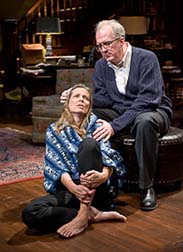
What is also thematic is a neurotic co-dependency. George and Martha are trapped and can‘t get out. You‘d think that even in the sixties they‘d get divorced. Instead they play games of illusions of lies.
I found it curious that at the start Honey seems to interrupt and dominate conversation directed at her husband. Maybe Albee wants to suggest that they‘re on the same path as George and Martha, proving as Martha says that “marriage is a trap.”
Albee, famous for his theater of the absurd, shows here a mix of the naturalistic and the bizarre that inhabits real lives, or at least their exaggerated version. You’ll walk out feeling wrung out. Which must be what the author and director had in mind.
“Who‘s Afraid of Virginia Woolf.” Written by Edward Albee; directed by Pam MacKinnon. Steppenwolf Theatre Company at the Booth Theatre, 222 West 45th St, New York City. (212) 239-6200. Opened Oct 13, 2012; closes Feb 24, 2013.

